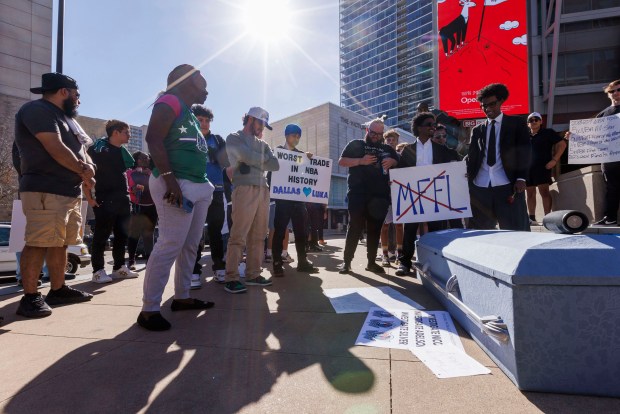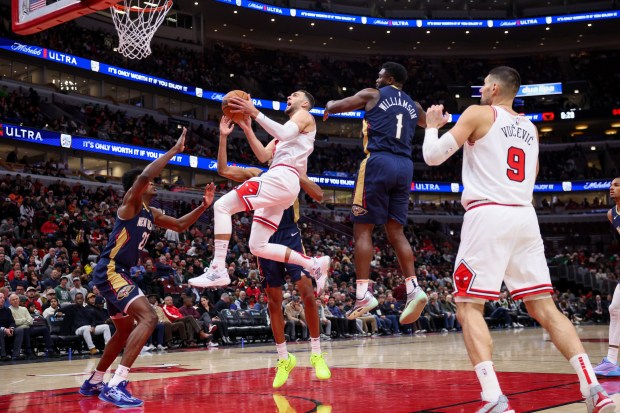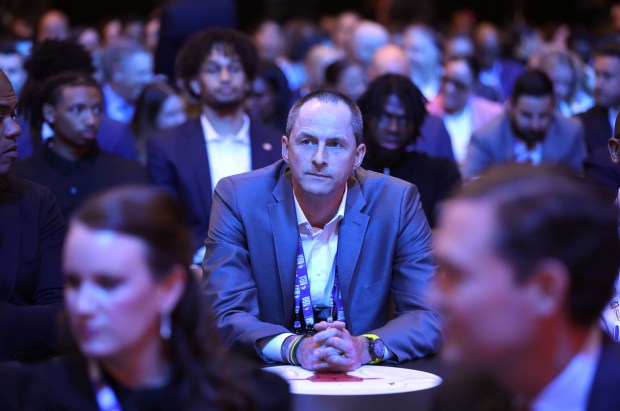When the Edmonton Oilers dealt superstar Wayne Gretzky to the Los Angeles Kings in 1988, the entire city went into a collective depression.
“It’s like ripping the heart out of a city,” Edmonton mayor Laurence Decore said. “It’s like taking all the bridges away and saying ‘Edmonton, this is what you’re going to look like.’”
We’re not sure whether Dallas will ever recover from Saturday’s shocking news that superstar Luka Dončić was dealt by the Mavericks to the Los Angeles Lakers in a three-team, blockbuster trade that brought back All-Star forward Anthony Davis.
Judging from social media reactions, no one will.
But thanks in part to the biggest NBA trade in decades, the Chicago Bulls were finally able to end their three-year trade deadline drought, sending Zach LaVine to Sacramento in a three-team, multi-player-and-draft-picks trade with the Kings and San Antonio Spurs, according to an ESPN report. Kings star De’Aaron Fox, the main meal, went to the Spurs, who signaled they were going for broke to keep up with the rest of the West.
The Bulls arguably got the worst of the three teams in their deal, acquiring three non-stars in Zach Collins, Tre Jones and Kevin Huerter, plus their own 2025 first-round pick from the Spurs.
But executive vice president of basketball operations Artūras Karnišovas can finally say he did something. So there’s that.
In the summer of 2022, he handed LaVine a max contract of $215 million, the largest in team history, to be the face of the franchise. DeMar DeRozan turned out to be the better player, and two and a half years later, DeRozan and LaVine are reunited in Sacramento, the Bulls are back to square one, and the search for a new face goes on.
Excuse us if you’ve lived through this before, perhaps multiple times.
In Chicago, where we’ve been waiting for Karnišovas to pull off a trade deadline deal for so long that the most oft-asked question early Sunday was: “If the Mavs and Lakers could find a way to deal their high-priced superstars, why can’t the Bulls find a suitor for LaVine?”
The sheer embarrassment of going through another deadline without making a move, following the wild, buzz-creating, three-way deal created by the Mavs and Lakers, would’ve been too much for even Bulls Chairman Jerry Reinsdorf to stomach.
Reinsdorf surely knew any negative fan reaction the Bulls would receive for an uninspiring haul for LaVine would pale in comparison to the pounding Dallas was taking for dealing Dončić in his prime. “Just do it!” as the sneaker ad suggested.
Sunday was already a day that would go down in NBA history, as millions of fans woke up to the shocking trade news. Mavericks fans reportedly brought a coffin to the American Airlines Center, the team’s home, in an impromptu protest over the trade. Every player and athlete in America was posting their thoughts on the deal on social media, including Kansas City Chiefs quarterback Patrick Mahomes, who we can only assume has other things on his mind this week.
Everyone tried to comprehend how a team could get rid of a 25-year-old generational talent and one of the world’s most popular players. Was it his lack of conditioning? A personality conflict with management? Concerns over signing an out-of-shape star to the five-year, $345 million supermax contract he was eligible for this summer? Or just the fact that Dončić refused to play any semblance of defense?

Mavericks general manager Nico Harrison told ESPN that “defense wins championships,” and that “getting an All-Defensive center and an All-NBA player with a defensive mindset gives us a better chance (of winning one).”
No one believed him, of course. Dončić’s ability to score from anywhere on the court helped lead them to the NBA Finals last year, despite his defensive limitations. On Sunday, Harrison admitted it was partly the contract and the possibility of losing him for nothing.
“There’s other teams that were loading up that he was going to be able to decide, make his own decision at some point of whether he wants to be here or not,” Harrison said. “Whether we want to supermax him or not, or whether he wants to opt-out. So I think we had to take all that into consideration, and I feel like we got out in front of what could have been a tumultuous summer.”
Conspiracy theories swirled around the deal, which teams up two prolific scorers who usually demand to have the ball in their hands. Dončić and LeBron James will likely be a duo you can’t stop watching, and ESPN and TNT executives are no doubt scrambling to air more Lakers games for the rest of the season, and for the rest of James’ career in Los Angeles, if he remains after this season.
And if “the King” doesn’t stay, it’s Dončić’s town, and all of Hollywood can rest easy that the Laker aura will remain strong in a post-LeBron world.
For a league that’s been busy fending off the narrative that it’s turning away fans with nonstop 3-point shooting, the monumental reaction to the Dallas trade shows the NBA is not yet dead. In fact, this could be the NBA’s equivalent of mouth-to-mouth resuscitation.

The move that sent LaVine to Sacramento, in contrast, was received with a virtual shrug in Chicago, where the Bulls remain unseen by millions of fans because of their new TV network’s lack of a deal with Comcast. Three years of inactivity at the deadline, and no TV for many, helped dull the senses of diehard Bulls fans, who expect nothing from management and are seldom disappointed.
The Bulls fell to 21-29 on the season Sunday after a 127-119 loss at Detroit, and the urgency to unload veterans to start a rebuild was glaring. By Sunday night, the dam finally broke.
The Dončić trade figured to make Western Conference contenders look for deals to improve their playoff chances, making LaVine, Nikola Vučević, Lonzo Ball and all other Bulls possible targets. Who knows what’s next?
Perhaps the Mavericks-Lakers megadeal made Karnišovas a motivated seller of the original nucleus. Of course, that would imply we know what motivates him. He’s one of the least accessible executives in Chicago sports, perhaps second only to Reinsdorf, who hired him.
What’s on A.K.’s mind stays on A.K.’s mind. His silence is not only Reinsdorf-approved, but probably one of the job requirements.
The Mavs’ decision to unload a player as popular as Dončić before paying him a supermax deal also makes one wonder whether Karnišovas made the right call when the Bulls handed LaVine the max contract of five years and $215.2 million after the 2021-22 season. It was widely lauded by Bulls fans and media, but LaVine was coming off arthroscopic surgery on his left knee, and he had torn the ACL in that knee in 2016, so there were legitimate concerns.
LaVine is still an elite player, but would they have been better off letting him leave, moving on and spending that money elsewhere? The Bulls proved they couldn’t contend with LaVine as their primary scorer, and now we’ll see if reuniting with DeRozan in Sacramento can push the Kings into contention in the West.

LaVine was always a good citizen in Chicago, despite wanting out by the second year of his deal.
“I think going forward the best way to handle a lot of stuff is I’m in a great situation, a great headspace,” LaVine said on the first day of training camp this season. “I’m fully healthy right now, which I don’t take for granted. Anything negative that will try and pin me, the organization, rumors, drama, whatever it is, I’ll leave that in the past.”
He did just that and has performed at a high level during the first half while acting like the professional he is. Still, the Bulls couldn’t afford to play at their current pace and pretend they were moving forward. Dealing LaVine and giving up on 2025 was the only way to kickstart the inevitable rebuild next summer, no matter what they got in return.
Could Karnišovas have gotten more?
Maybe, but he only needs the approval of one person to be satisfied with his return — the one who pays his salary.



